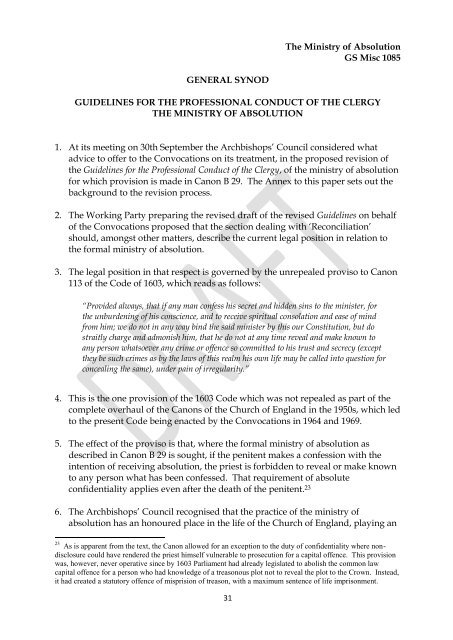gs 1970 - draft guidelines for the professional conduct of the clergy
gs 1970 - draft guidelines for the professional conduct of the clergy
gs 1970 - draft guidelines for the professional conduct of the clergy
Create successful ePaper yourself
Turn your PDF publications into a flip-book with our unique Google optimized e-Paper software.
The Ministry <strong>of</strong> AbsolutionGS Misc 1085GENERAL SYNODGUIDELINES FOR THE PROFESSIONAL CONDUCT OF THE CLERGYTHE MINISTRY OF ABSOLUTION1. At its meeting on 30th September <strong>the</strong> Archbishops’ Council considered whatadvice to <strong>of</strong>fer to <strong>the</strong> Convocations on its treatment, in <strong>the</strong> proposed revision <strong>of</strong><strong>the</strong> Guidelines <strong>for</strong> <strong>the</strong> Pr<strong>of</strong>essional Conduct <strong>of</strong> <strong>the</strong> Clergy, <strong>of</strong> <strong>the</strong> ministry <strong>of</strong> absolution<strong>for</strong> which provision is made in Canon B 29. The Annex to this paper sets out <strong>the</strong>background to <strong>the</strong> revision process.2. The Working Party preparing <strong>the</strong> revised <strong>draft</strong> <strong>of</strong> <strong>the</strong> revised Guidelines on behalf<strong>of</strong> <strong>the</strong> Convocations proposed that <strong>the</strong> section dealing with ‘Reconciliation’should, amon<strong>gs</strong>t o<strong>the</strong>r matters, describe <strong>the</strong> current legal position in relation to<strong>the</strong> <strong>for</strong>mal ministry <strong>of</strong> absolution.3. The legal position in that respect is governed by <strong>the</strong> unrepealed proviso to Canon113 <strong>of</strong> <strong>the</strong> Code <strong>of</strong> 1603, which reads as follows:“Provided always, that if any man confess his secret and hidden sins to <strong>the</strong> minister, <strong>for</strong><strong>the</strong> unburdening <strong>of</strong> his conscience, and to receive spiritual consolation and ease <strong>of</strong> mindfrom him; we do not in any way bind <strong>the</strong> said minister by this our Constitution, but dostraitly charge and admonish him, that he do not at any time reveal and make known toany person whatsoever any crime or <strong>of</strong>fence so committed to his trust and secrecy (except<strong>the</strong>y be such crimes as by <strong>the</strong> laws <strong>of</strong> this realm his own life may be called into question <strong>for</strong>concealing <strong>the</strong> same), under pain <strong>of</strong> irregularity.”4. This is <strong>the</strong> one provision <strong>of</strong> <strong>the</strong> 1603 Code which was not repealed as part <strong>of</strong> <strong>the</strong>complete overhaul <strong>of</strong> <strong>the</strong> Canons <strong>of</strong> <strong>the</strong> Church <strong>of</strong> England in <strong>the</strong> 1950s, which ledto <strong>the</strong> present Code being enacted by <strong>the</strong> Convocations in 1964 and 1969.5. The effect <strong>of</strong> <strong>the</strong> proviso is that, where <strong>the</strong> <strong>for</strong>mal ministry <strong>of</strong> absolution asdescribed in Canon B 29 is sought, if <strong>the</strong> penitent makes a confession with <strong>the</strong>intention <strong>of</strong> receiving absolution, <strong>the</strong> priest is <strong>for</strong>bidden to reveal or make knownto any person what has been confessed. That requirement <strong>of</strong> absoluteconfidentiality applies even after <strong>the</strong> death <strong>of</strong> <strong>the</strong> penitent. 236. The Archbishops’ Council recognised that <strong>the</strong> practice <strong>of</strong> <strong>the</strong> ministry <strong>of</strong>absolution has an honoured place in <strong>the</strong> life <strong>of</strong> <strong>the</strong> Church <strong>of</strong> England, playing an23 As is apparent from <strong>the</strong> text, <strong>the</strong> Canon allowed <strong>for</strong> an exception to <strong>the</strong> duty <strong>of</strong> confidentiality where nondisclosurecould have rendered <strong>the</strong> priest himself vulnerable to prosecution <strong>for</strong> a capital <strong>of</strong>fence. This provisionwas, however, never operative since by 1603 Parliament had already legislated to abolish <strong>the</strong> common lawcapital <strong>of</strong>fence <strong>for</strong> a person who had knowledge <strong>of</strong> a treasonous plot not to reveal <strong>the</strong> plot to <strong>the</strong> Crown. Instead,it had created a statutory <strong>of</strong>fence <strong>of</strong> misprision <strong>of</strong> treason, with a maximum sentence <strong>of</strong> life imprisonment.31


